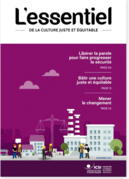Debris-flow activity in the Alps is anticipated to undergo pronounced changes in response to a warming climate. Yet, a fundamental challenge in comprehensively assessing changes in process activity is the systematic lack of long-term observational debris-flow records. Here, we reconstruct the longest, continuous time series (1626-2020) of debris flows at Multetta, a supply-limited torrential system in the Eastern Swiss Alps. Relying on growth-ring records of trees that were damaged by debris flows, we do not detect significant changes in the frequency or magnitude over time. This seeming absence of a direct climatic influence on debris-flow initiation aligns with the regular distribution of repose time patterns, indicating a dependence of local process activity on sediment discharge and recharge. This stark difference in process behavior between our supply-limited site and transport-limited catchments has implications for assessing torrential hazard and risk mitigation in a context of global warming.
Mots clés :

[ Ressource électronique ]
0000
[ Ressource électronique ]
0000
[ Ressource électronique ]
0000
[ Ressource électronique ]
0000
[ Ressource électronique ]
0000
[ Ressource électronique ]
0000
[ Ressource électronique ]
0000
[ Ressource électronique ]
0000, Paris : Ecole des Mines de Paris

[ Ressource électronique ]
2025, Echos de science

[ Ressource électronique ]
0000

[ Ressource électronique ]
2019, Institut fédéral de recherches sur la forêt, la neige et le paysage WSL

